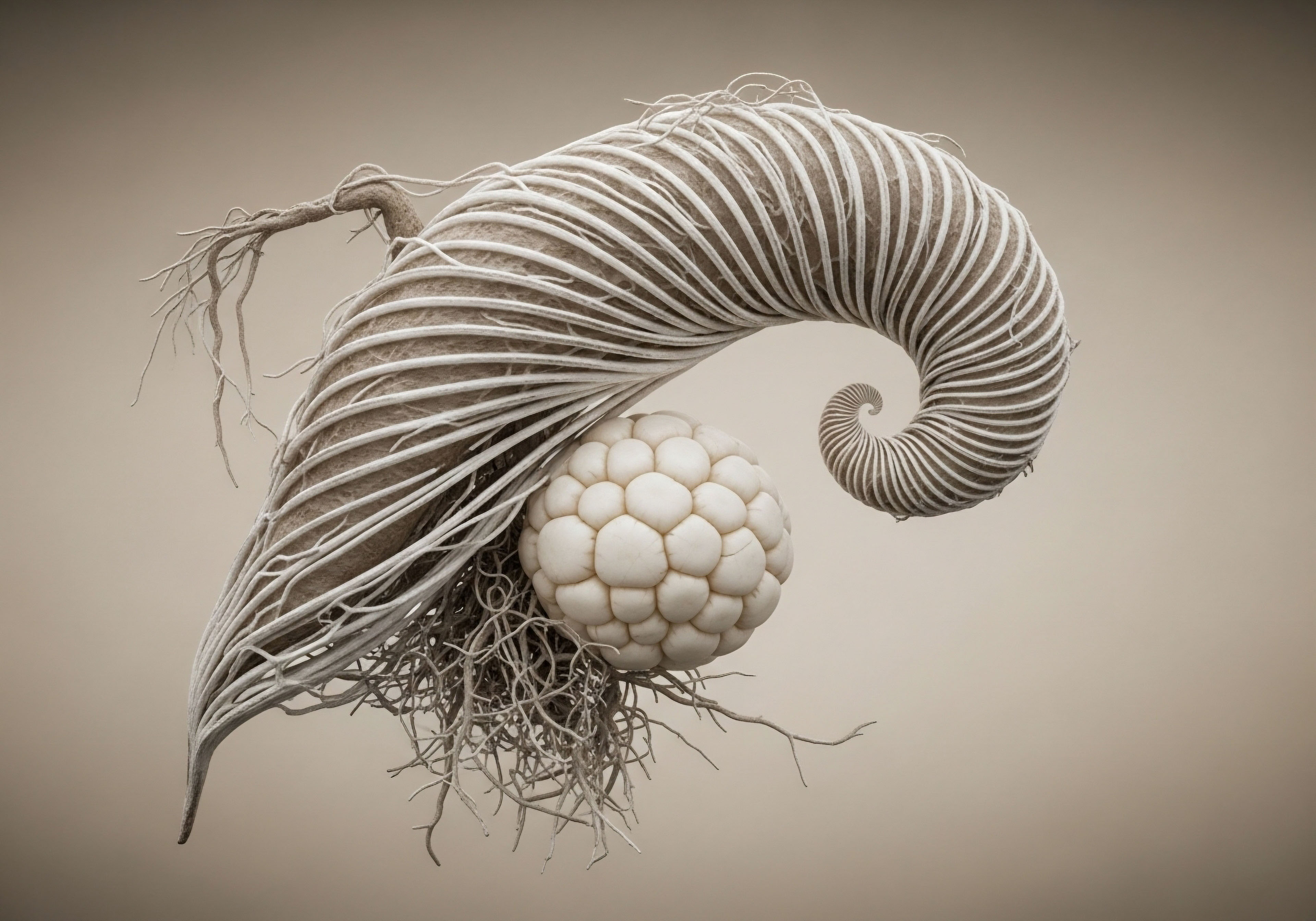

The Shifting Landscape of Human Capability
A quiet disquiet often surfaces in adulthood. Individuals observe a subtle retreat from peak performance, a fading of mental agility, a diminishment of spontaneous vigor. This experience transcends simple fatigue; it signals a deeper biological shift, a recalibration of internal systems that once hummed with effortless efficiency. We accept this biological drift as an inevitable consequence of passing years. However, this acceptance limits our potential.
The prevailing narrative suggests a predetermined decline. Conventional wisdom presents a future where cognitive sharpness dulls, memory retention falters, and mental energy wanes. These are often framed as an unavoidable part of the human journey. Yet, the forefront of biological science paints a fundamentally different picture. We possess far greater agency over our internal state than previously acknowledged.
Modern understanding of brain health moves beyond managing decline. It presents a proactive stance, a deliberate cultivation of the brain’s capacity for growth and adaptation. The concept of neurogenesis, the brain’s remarkable ability to generate new neurons, stands as a central pillar in this new framework. This is not a speculative theory; it is a demonstrable biological process, one we can actively influence.
Emerging research indicates that purposeful intervention can reignite neurogenesis, offering a tangible pathway to sustained cognitive vitality and enhanced mental resilience.
Many individuals experience moments of mental stagnation or a general dulling of their inner spark. The once sharp recall may become sluggish, problem-solving demands more effort, and the clarity of thought frequently eludes reach. These are potent signals, prompts to investigate beyond superficial solutions. They highlight a need to address foundational biological mechanisms.
Consider the profound implications of actively building new brain cells. This process translates directly into improved learning capacity, enhanced mood stability, and a robust defense against cognitive challenges. Imagine a future where mental acuity intensifies with deliberate action, rather than diminishes over time. This perspective shifts the focus from merely coping with biological realities to actively sculpting them.
Opting for proactive measures in cognitive health defines a new standard of living. This involves rejecting passive acceptance of age-related changes and embracing an empowered approach to biological optimization. Neurogenesis represents a powerful frontier in this pursuit, offering a verifiable mechanism for cultivating peak mental performance throughout every phase of life. We redefine what is possible for our brains.
This approach centers on the premise that the brain remains a dynamic, adaptable organ, capable of profound self-renewal. The drive to optimize cognitive function mirrors the drive for physical excellence. Just as we train our bodies to perform at their best, we can apply advanced protocols to fortify our minds, ensuring sustained intellectual prowess and emotional equilibrium. The modern individual seeks more than mere existence; they demand optimized performance across all biological systems.


Governing the Brain’s Growth Trajectory
Neurogenesis, the creation of new neurons from neural stem cells, primarily occurs in specific brain regions, notably the hippocampus. This area is central to learning, memory formation, and emotional regulation. The process involves several intricate steps, from the proliferation of stem cells to their differentiation into mature neurons and their integration into existing neural networks. Understanding this biological architecture provides the foundation for targeted intervention.
Think of the brain as a highly sophisticated, self-repairing supercomputer. Over time, its processing units can degrade, and its memory banks might lose capacity. Traditional approaches focus on patching existing software. A forward-thinking strategy, however, centers on upgrading the hardware itself, adding new, more efficient processors and expanding storage capabilities. Neurogenesis embodies this hardware upgrade, a biological recalibration of the brain’s fundamental processing power. This involves activating dormant cellular potential.
Achieving optimal neurogenesis requires a multi-pronged approach, targeting the various pathways influencing neural stem cell activity and survival. This integrated strategy considers systemic biological factors that either support or inhibit neural growth.
Key strategies for promoting neurogenesis include:
- Hormone Recalibration Protocols ∞ Hormones act as master regulators of cellular function throughout the body, including the brain. Testosterone, estrogen, and growth hormone display direct influence on neurogenesis and synaptic plasticity. Calibrating these hormonal signals to their optimal range can significantly enhance the brain’s regenerative capacity. For instance, balanced testosterone levels support neural stem cell proliferation and survival, while optimized estrogen levels contribute to synaptic density and connectivity. Growth hormone, particularly through its mediator IGF-1, plays a critical role in brain development and repair, facilitating new neuronal growth. These hormones are not merely for reproductive function; they are central to brain vitality.
-
Targeted Peptide Protocols ∞ Peptides represent a powerful class of signaling molecules capable of delivering precise instructions to cells. Specific peptides directly influence neurogenesis, neuronal survival, and synaptic function.
- Cerebrolysin ∞ This neurotrophic peptide preparation directly stimulates neuronal growth and survival. It functions by mimicking the action of naturally occurring neurotrophic factors, supporting the formation of new neural connections and enhancing overall brain plasticity. Its application reinforces the brain’s intrinsic capacity for repair and adaptation.
- Semax and Selank ∞ These short peptides act on brain chemistry to promote cognitive enhancement and reduce anxiety. Semax modulates brain-derived neurotrophic factor (BDNF) expression, a key protein for neurogenesis and neuronal survival. Selank influences the brain’s endogenous regulatory peptides, supporting neural resilience and emotional balance. Their influence extends to improving focus and mental endurance.
- Cognitive Load and Learning ∞ The brain responds to challenge by adapting. Engaging in novel, complex learning activities stimulates neurogenesis. This involves continuously pushing intellectual boundaries through new skills, languages, or problem-solving tasks. Consistent cognitive engagement provides the necessary demand for new neural circuits. Mental exercise is as vital as physical training.
- Strategic Movement Practices ∞ Physical activity, particularly aerobic exercise, increases blood flow to the brain and elevates levels of neurotrophic factors, including BDNF. Regular, intense movement acts as a potent catalyst for neurogenesis, especially in the hippocampus. Exercise delivers a powerful biological signal for brain growth and repair, fostering an environment conducive to neural regeneration.
- Precision Nutritional Architectures ∞ Diet profoundly impacts brain health. Nutrient-dense foods, rich in omega-3 fatty acids, antioxidants, and specific micronutrients, support neuronal membrane integrity and mitigate oxidative stress. Limiting inflammatory foods and optimizing gut health indirectly supports brain function and neurogenesis, ensuring the brain receives optimal building blocks and signals.
- Optimized Sleep Cycles ∞ Sleep functions as a critical period for brain detoxification and memory consolidation. Disruptions to sleep patterns negatively impact neurogenesis and overall cognitive performance. Prioritizing consistent, high-quality sleep allows the brain to conduct essential restorative processes, including the integration of newly formed neurons. Deep sleep phases are particularly important for these processes.
The deliberate orchestration of hormonal balance, targeted peptide administration, and lifestyle optimization activates dormant neural pathways, sculpting a more resilient and dynamic cognitive framework.
Implementing these strategies necessitates a precise, individualized assessment. Understanding an individual’s unique biological blueprint, including hormonal profiles and genetic predispositions, guides the creation of a bespoke neurogenesis protocol. This is a scientific endeavor, moving beyond generic recommendations to data-driven interventions. The goal remains to create a brain environment primed for continuous growth and superior function.
A structured approach might begin with comprehensive biomarker testing to establish a baseline. This informs the selection and dosing of specific hormone and peptide interventions. Concurrent lifestyle modifications, including a refined nutritional strategy and a rigorous exercise regimen, amplify the biological signals for neurogenesis. Consistent monitoring and adaptation of the protocol ensures sustained progress and optimal outcomes. This ongoing recalibration represents a commitment to perpetual self-optimization.


Timing the Neural Renaissance
The timing for considering a neurogenesis-focused protocol aligns with any perceived decrement in cognitive performance or a proactive desire to fortify future mental resilience. Individuals often reach a point where conventional strategies yield diminishing returns. This marks an opportune moment to explore advanced biological optimization.
Many find themselves at a crossroads when the familiar sharpness begins to dull. Memory lapses become more frequent. Sustained focus demands greater effort. The ability to rapidly process complex information seems to wane. These signals indicate a potential decline in neural plasticity and regenerative capacity. Engaging a neurogenesis protocol at this juncture means reversing trajectory, not merely slowing a decline.
A proactive stance involves commencing these protocols before overt signals manifest. For those committed to lifelong peak performance, brain optimization becomes an integral component of their wellness architecture. This perspective sees neurogenesis as a strategic investment in cognitive longevity, ensuring a robust mental framework for decades. The future self benefits immensely from present actions.
Tangible benefits typically emerge over a structured timeline. Initial changes often manifest as improved mental clarity and increased energy levels within weeks. Enhanced sleep quality and reduced mental fog are frequently reported early indicators. This initial phase reflects the brain’s rapid response to improved internal signaling and nutrient delivery.
Over several months, more profound changes solidify. Individuals report a significant improvement in memory recall, particularly working memory. Learning new information becomes easier and more efficient. Creative problem-solving abilities often experience a notable uplift. This extended period allows for the maturation and integration of newly formed neurons into functional circuits, translating into measurable cognitive gains. The brain adapts and strengthens.
Long-term adherence to these protocols cultivates sustained cognitive vibrancy. The brain becomes more resilient to stressors, more adept at learning, and more efficient in its overall operation. This creates a powerful compounding effect, where foundational biological improvements lead to superior everyday function and an elevated quality of life. The commitment yields exponential returns.
Individuals frequently report a remarkable resurgence of mental agility and processing speed within three to six months of consistent adherence to a tailored neurogenesis protocol.
Consider specific life transitions as prime windows for intervention. Periods of high intellectual demand, such as professional advancements or intensive study, benefit from enhanced neural capacity. Similarly, navigating the inherent cognitive shifts associated with aging provides a compelling reason to actively support neurogenesis. These protocols offer a robust tool for mastering such transitions, providing a distinct competitive edge.
This journey embodies self-mastery. It involves understanding the sophisticated mechanisms within your own biology and applying precise, evidence-based strategies to sculpt a superior future. The transition from merely existing to operating at an optimized level is profound. This proactive engagement defines the modern pursuit of unparalleled vitality. Your brain, the ultimate processing unit, deserves nothing short of this level of deliberate cultivation.

The Infinite Recalibration of Being
We stand at a unique juncture in human history, equipped with insights and tools that once seemed science fiction. The capacity to influence neurogenesis, to sculpt the very fabric of our minds, reshapes our understanding of human potential. This is not about arresting time; it revolves around optimizing our internal systems to operate with peak efficiency, irrespective of chronological age. It represents a continuous upgrade.
The ultimate frontier lies within our own biology. We possess the blueprint for remarkable self-renewal, and the path forward involves activating those intrinsic capabilities. This is a journey of active participation, moving beyond passive observation of biological processes to becoming the deliberate architect of one’s own cognitive destiny. The future of human performance is not a distant concept; it is an active construction, beginning today.
“The future belongs to those who learn more skills and combine them in creative ways,” wrote Robert Greene. This applies powerfully to the skills of biological optimization. Mastering your brain’s capacity for growth provides an unparalleled advantage in a world demanding constant adaptation and intellectual agility. Your most powerful asset remains your mind.
The decision to pursue enhanced neurogenesis marks a powerful commitment to a life lived at full spectrum. It is a declaration of intent to move beyond limitations, to continuously expand cognitive horizons, and to experience an enduring clarity of thought. This ongoing recalibration of being provides the ultimate leverage for an extraordinary existence.

Glossary

brain health

neurogenesis

mental acuity




